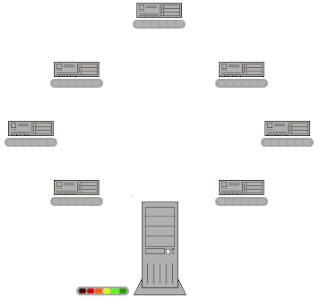Related Research Articles
Social software, also known as social apps, include communication and interactive tools often based on the Internet. Communication tools typically handle the capturing, storing and presentation of communication, usually written but increasingly including audio and video as well. Interactive tools handle mediated interactions between a pair or group of users. They focus on establishing and maintaining a connection among users, facilitating the mechanics of conversation and talk. Social software generally refers to software that makes collaborative behaviour, the organisation and moulding of communities, self-expression, social interaction and feedback possible for individuals. Another element of the existing definition of social software is that it allows for the structured mediation of opinion between people, in a centralized or self-regulating manner. The most improved area for social software is that Web 2.0 applications can all promote cooperation between people and the creation of online communities more than ever before.

BitTorrent is a communication protocol for peer-to-peer file sharing (P2P), which enables users to distribute data and electronic files over the Internet in a decentralized manner.

An Internet forum, or message board, is an online discussion site where people can hold conversations in the form of posted messages. They differ from chat rooms in that messages are often longer than one line of text, and are at least temporarily archived. Also, depending on the access level of a user or the forum set-up, a posted message might need to be approved by a moderator before it becomes publicly visible.

A captive portal is a web page accessed with a web browser that is displayed to newly connected users of a Wi-Fi or wired network before they are granted broader access to network resources. Captive portals are commonly used to present a landing or log-in page which may require authentication, payment, acceptance of an end-user license agreement, acceptable use policy, survey completion, or other valid credentials that both the host and user agree to adhere by. Captive portals are used for a broad range of mobile and pedestrian broadband services – including cable and commercially provided Wi-Fi and home hotspots. A captive portal can also be used to provide access to enterprise or residential wired networks, such as apartment houses, hotel rooms, and business centers.

Gmail is a free email service provided by Google. As of 2019, it had 1.5 billion active users worldwide. A user typically accesses Gmail in a web browser or the official mobile app. Google also supports the use of email clients via the POP and IMAP protocols.
Internet privacy involves the right or mandate of personal privacy concerning the storing, repurposing, provision to third parties, and displaying of information pertaining to oneself via Internet. Internet privacy is a subset of data privacy. Privacy concerns have been articulated from the beginnings of large-scale computer sharing.
A BitTorrent tracker is a special type of server that assists in the communication between peers using the BitTorrent protocol.
In computing and specifically in Internet slang, a leech is one who benefits, usually deliberately, from others' information or effort but does not offer anything in return, or makes only token offerings in an attempt to avoid being called a leech. In economics, this type of behavior is called "free riding" and is associated with the free rider problem. The term originated in the bulletin board system era, when it referred to users that would download files and upload nothing in return.
The public history of Gmail dates back to 2004. Gmail, a free, advertising-supported webmail service with support for Email clients, is a product from Google. Over its history, the Gmail interface has become integrated with many other products and services from the company, with basic integration as part of Google Account and specific integration points with services such as Google+, Google Calendar, Google Drive, Google Hangouts, Google Meet, YouTube, and Google Buzz. It has also been made available as part of G Suite. The Official Gmail Blog tracks the public history of Gmail from July 2007.
A home server is a computing server located in a private residence providing services to other devices inside or outside the household through a home network or the Internet. Such services may include file and printer serving, media center serving, home automation control, web serving, web caching, file sharing and synchronization, video surveillance and digital video recorder, calendar and contact sharing and synchronization, account authentication, and backup services.
This is a glossary of jargon related to peer-to-peer file sharing via the BitTorrent protocol.

Outlook.com is a personal information manager web app from Microsoft consisting of webmail, calendaring, contacts, and tasks services. Founded in 1996 by Sabeer Bhatia and Jack Smith as Hotmail, it was acquired by Microsoft in 1997 for an estimated $400 million and relaunched as MSN Hotmail, later rebranded to Windows Live Hotmail as part of the Windows Live suite of products. Microsoft phased out Hotmail in October 2011, relaunching the service as Outlook.com in 2012.
Google Friend Connect was a free social networking site from 2008 to 2012. Similar in practice to Facebook Platform and MySpaceID, it took a decentralised approach, allowing users to build a profile to share and update information via third-party sites. These sites acted as a host for profile sharing and social exchanges.
Torrent poisoning is intentionally sharing corrupt data or data with misleading file names using the BitTorrent protocol. This practice of uploading fake torrents is sometimes carried out by anti-infringement organisations as an attempt to prevent the peer-to-peer (P2P) sharing of copyrighted content, and to gather the IP addresses of downloaders.
Social login is a form of single sign-on using existing information from a social networking service such as Facebook, Twitter or Google, to sign into a third party website instead of creating a new login account specifically for that website. It is designed to simplify logins for end users as well as provide more and more reliable demographic information to web developers.

Twister is free software for experimental peer-to-peer microblogging. Being completely decentralized means that no one is able to shut it down, as there is no single point to attack. The system uses end-to-end encryption to safeguard communications. It is based on both BitTorrent and Bitcoin-like protocols and is considered a (distributed) Twitter clone.

Ello is an online social networking service created by Paul Budnitz and Todd Berger in March 2014. It was created as an ad-free alternative to existing social networks. It has pivoted from its earlier Facebook-like incarnation toward a Pinterest-like website showcasing art, photography, fashion and web culture.

Inbox by Gmail was an email service developed by Google. Announced in limited invitation-only basis on October 22, 2014, it was officially released to the public on May 28, 2015. Inbox was shut down by Google on April 2, 2019.
Google's changes to its privacy policy on March 16, 2012 enabled the company to share data across a wide variety of services. These embedded services include millions of third-party websites that use AdSense and Analytics. The policy was widely criticized for creating an environment that discourages Internet-innovation by making Internet users more fearful and wary of what they put online.
Spy pixels or tracker pixels are hyperlinks to remote image files in HTML email messages that have the effect of spying on the person reading the email if the image is downloaded. They are commonly embedded in the HTML of an email as small, imperceptible, transparent graphic files. Spy pixels are commonly used in marketing, and there are several countermeasures in place that aim to block email tracking pixels. However, there are few regulations in place that effectively guard against email tracking approaches.
References
- ↑ SpeakUp - "Ffffantastic Bookmarking." Published 17 October 2007. Retrieved 20 October 2009.
- ↑ Kirk, Jeremy. "Gmail finally opens to all". macworld.com. IDG Consumer & SMB. Retrieved 16 February 2014.